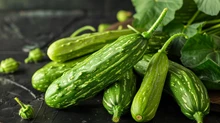
Kimchi and sauerkraut are two popular fermented foods that are made from cabbage. While kimchi is a traditional Korean dish that has gained traction as a side dish in other Asian cuisines, however, sauerkraut is one of the national dishes of Germany and is popular in European countries and in the United States of America. Sauerkraut’s origins trace back to ancient China.
Both kimchi and sauerkraut go through the process of fermentation which leads to the growth of probiotics or beneficial bacteria which improve our immune system, heart health, and digestive system. Some of the probiotic strains found in these fermented foods have also been linked with reducing symptoms of anxiety and depression. Studies indicate that they also reduce stress.
What is Kimchi?
Kimchi is a traditional Korean side dish that is usually made from fermented cabbage and radish. The fermented vegetables are generally seasoned with salt, sugar, Korean chili powder, Korean chili paste, garlic, ginger, and onions. The period of fermentation can last somewhere between a couple of days to a couple of weeks.
However, some people even enjoy it unfermented, immediately after preparation. It is used extensively in Korean cuisine to make soups, stews, and fried rice, or is just eaten on its own. Its heavy consumption is not only because of its delectable taste but also because of its several health benefits.
Kimchi is packed with nutrients. A cup of kimchi or a 50-gram serving has at most 25 calories and less than 1 gram of fat. It has 5 grams of carbohydrates, 2 grams of fiber, 750 grams of sodium, and at least 2 grams of protein. It also has large quantities of vitamin B6, vitamin C, vitamin K, folate, iron, riboflavin, and niacin.
The fermentation process not only extends Kimchi’s shelf life and enhances its flavor but also creates a friendly environment of probiotics or good bacteria that has several health benefits. For instance, it improves our gastrointestinal health, skin health, heart health, and mental health. Eating kimchi regularly strengthens our immune system, helps reduce inflammation, and slows down the aging process.
What is Sauerkraut?
Sauerkraut is considered one of the national dishes of Germany, however, historians believe that it did not originate in Germany and was most likely developed in China. Sauerkraut is made from the process of lactic acid fermentation, which gives it its distinctive sour flavor and long shelf life.
A cup of sauerkraut or at least 100 grams of sauerkraut has at most 30 calories, 0 grams of fat, 1 gram of protein, 4 grams of fiber, and 6 grams of carbohydrates. It is a rich source of sodium, vitamin C, vitamin K1, iron, potassium, copper, folate, and manganese. Just like kimchi, sauerkraut contains probiotics that improve our digestion and overall health.
It helps us lose weight as it is low in calories and high in fiber. It boosts our immune system and even reduces the risk of developing infections such as urinary tract infections and the common cold. Several studies show that there is a direct relationship between the food we eat and our mood. Sauerkraut and other fermented food contribute towards healthy gut flora. Therefore, it helps improve our mood and brain function.
Kimchi vs Sauerkraut: What’s the Difference?
Both Kimchi and Sauerkraut has Asian origins, however, modern-day sauerkraut is largely associated with Germany because of its popularity there. Sauerkraut has a milder taste than kimchi as it is seasoned with just sea salt and caraway seeds. However, kimchi is seasoned with spicey Korean chili powder known as Gochugaru, red chili paste or gochujang, garlic, ginger, vinegar, and salt.
Unlike sauerkraut which is always made with cabbage, kimchi can be made with any vegetable or combination of vegetables. When it comes to the taste, because of its simple preparation, sauerkraut tastes like tangy and acidic fermented cabbage. On the other hand, kimchi is spicier and saltier than sauerkraut. Kimchi has a signature umami flavour.










